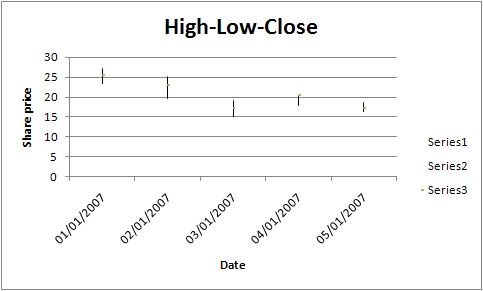NAME
Stock - A class for writing Excel Stock charts.
SYNOPSIS
To create a simple Excel file with a Stock chart using Excel::Writer::XLSX:
#!/usr/bin/perl -w
use strict;
use Excel::Writer::XLSX;
my $workbook = Excel::Writer::XLSX->new( 'chart.xlsx' );
my $worksheet = $workbook->add_worksheet();
my $chart = $workbook->add_chart( type => 'stock' );
# Add a series for each High-Low-Close.
$chart->add_series(
categories => '=Sheet1!$A$2:$A$6',
values => '=Sheet1!$B$2:$B$6'
);
$chart->add_series(
categories => '=Sheet1!$A$2:$A$6',
values => '=Sheet1!$C$2:$C$6'
);
$chart->add_series(
categories => '=Sheet1!$A$2:$A$6',
values => '=Sheet1!$D$2:$D$6'
);
# Add the worksheet data the chart refers to.
# ... See the full example below.
__END__DESCRIPTION
This module implements Stock charts for Excel::Writer::XLSX. The chart object is created via the Workbook add_chart() method:
my $chart = $workbook->add_chart( type => 'stock' );Once the object is created it can be configured via the following methods that are common to all chart classes:
$chart->add_series();
$chart->set_x_axis();
$chart->set_y_axis();
$chart->set_title();These methods are explained in detail in Excel::Writer::XLSX::Chart. Class specific methods or settings, if any, are explained below.
Stock Chart Methods
There aren't currently any stock chart specific methods. See the TODO section of Excel::Writer::XLSX::Chart.
The default Stock chart is a High-Low-Close chart. A series must be added for each of these data sources.
EXAMPLE
Here is a complete example that demonstrates most of the available features when creating a Stock chart.
#!/usr/bin/perl
use strict;
use warnings;
use Excel::Writer::XLSX;
use Excel::Writer::XLSX;
my $workbook = Excel::Writer::XLSX->new( 'chart_stock.xlsx' );
my $worksheet = $workbook->add_worksheet();
my $bold = $workbook->add_format( bold => 1 );
my $date_format = $workbook->add_format( num_format => 'dd/mm/yyyy' );
my $chart = $workbook->add_chart( type => 'stock', embedded => 1 );
# Add the worksheet data that the charts will refer to.
my $headings = [ 'Date', 'High', 'Low', 'Close' ];
my $data = [
[ '2007-01-01T', '2007-01-02T', '2007-01-03T', '2007-01-04T', '2007-01-05T' ],
[ 27.2, 25.03, 19.05, 20.34, 18.5 ],
[ 23.49, 19.55, 15.12, 17.84, 16.34 ],
[ 25.45, 23.05, 17.32, 20.45, 17.34 ],
];
$worksheet->write( 'A1', $headings, $bold );
for my $row ( 0 .. 4 ) {
$worksheet->write_date_time( $row+1, 0, $data->[0]->[$row], $date_format );
$worksheet->write( $row+1, 1, $data->[1]->[$row] );
$worksheet->write( $row+1, 2, $data->[2]->[$row] );
$worksheet->write( $row+1, 3, $data->[3]->[$row] );
}
$worksheet->set_column( 'A:D', 11 );
# Add a series for each of the High-Low-Close columns.
$chart->add_series(
categories => '=Sheet1!$A$2:$A$6',
values => '=Sheet1!$B$2:$B$6',
);
$chart->add_series(
categories => '=Sheet1!$A$2:$A$6',
values => '=Sheet1!$C$2:$C$6',
);
$chart->add_series(
categories => '=Sheet1!$A$2:$A$6',
values => '=Sheet1!$D$2:$D$6',
);
# Add a chart title and some axis labels.
$chart->set_title ( name => 'High-Low-Close', );
$chart->set_x_axis( name => 'Date', );
$chart->set_y_axis( name => 'Share price', );
$worksheet->insert_chart( 'E9', $chart );
__END__This will produce a chart that looks like this:

AUTHOR
John McNamara jmcnamara@cpan.org
COPYRIGHT
Copyright MM-MMXX, John McNamara.
All Rights Reserved. This module is free software. It may be used, redistributed and/or modified under the same terms as Perl itself.